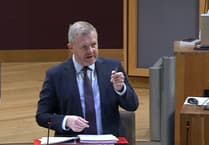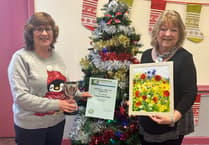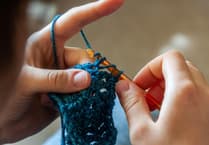Following the identification of Highly Pathogenic Avian Influenza in poultry at a site near Milford Haven in Pembrokeshire - the Chief Veterinary Officer for Wales has declared a 3km Avian Influenza Protection Zone and a 10km surveillance around the infected premises.
Officers from Pembrokeshire County Council’s Public Protection Division will be visiting addresses within the 3km Protection Zone around the site, to identify locations where poultry and/or other captive birds are kept and to provide information on restrictions that currently apply to help prevent the spread of disease.
In addition, road signs are currently being erected by the local authority to help clarify where these zones begin and end, which will remain in place until the restrictions can be lifted.
The Council’s officers are working in support of veterinary colleagues from the Animal and Plant Health Agency who are managing the response to the incident.
A map showing the extent of the zones and restrictions that apply can be seen on the Welsh Government website: Milford Haven, Pembrokeshire avian influenza protection and surveillance zones declaration: 30 October 2025 | GOV.WALES
It is vital keepers of birds remain vigilant and ensure they have the very highest levels of biosecurity in place. This will help keepers protect their birds from the risk of infection and to prevent further disease spread.
National Poultry Register
As of October 1st, 2024 – there is a requirement for all bird keepers regardless of the size of their flock to officially register their birds.
Do I need to register as a bird keeper?
You must register within one month of keeping poultry or other captive birds at any premises in Wales. You do not need to register your birds if they are kept entirely inside a domestic dwelling, such as a parrot, canary or budgie, which never leaves the property other than to visit a vet or another short-term period.
By registering their birds, keepers will ensure they receive important updates relevant to them, such as on any local avian disease outbreaks and information on biosecurity rules to help protect their flocks.
Bird keepers will need to provide information, including their contact details, the location where birds are kept and details of the birds (species, number and what they are kept for).
Responsibilities of people who keep birds:
· All keepers of kept birds should be vigilant for signs of the disease such as increased mortality, respiratory distress and drops in food or water intake, or egg production.
· Consult your veterinary surgeon in the first instance if your birds are unwell.
· If you or your vet suspect that avian influenza could be causing illness in your birds, you must, by law, report this to the Animal and Plant Health Agency Wales on 0300 303 8268. This will trigger a disease investigation by APHA vets.
· You must apply strict biosecurity measures to prevent any materials, equipment, vehicles, clothing, feed or bedding that could have been contaminated from wild birds coming onto your premises. Full details and checklist are available here: biosecurity and preventing disease in captive birds.
The UK health agencies advise that the risk to public health from the virus is very low and the UK food standards agencies advise that avian influenza poses a very low food safety risk for UK consumers.
Members of the public who do not keep birds can help by reporting dead wild birds
If you find dead wild waterfowl (swans, geese or ducks) or other dead wild birds such as gulls or birds of prey, you should report them to the Defra helpline on 03459 33 55 77.
These may be collected by DEFRA for examination and avian influenza surveillance, depending on the species and location. It is important not to pick up or touch any sick or dead birds.
Sick or injured wild birds should not be reported to Defra. Instead contact the RSPCA (in Wales and England) on 0300 1234 999 who may be able to offer assistance.
Dead birds on private land are to be dealt with by the landowner.





Comments
This article has no comments yet. Be the first to leave a comment.